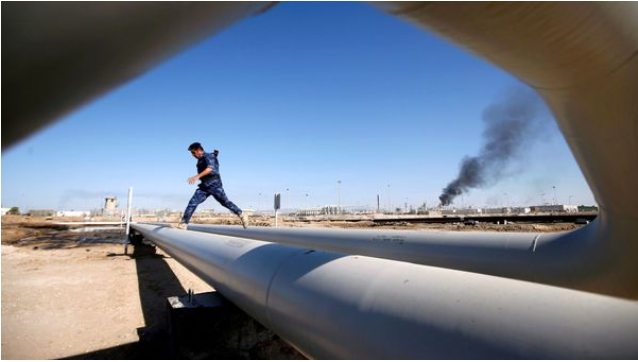An oil shock is the last thing India needs given the country is already running persistent current-account and fiscal deficits
Asian currencies have had a turbulent start to the year as geopolitical tensions have helped revive fears about an old foe that has undermined many of them in the past: crude oil.
Topics
Asian currenciesRupeePeso
Asian currencies have had a turbulent start to the year as geopolitical tensions have helped revive fears about an old foe that has undermined many of them in the past: crude oil.
India’s rupee, South Korea’s won, and the Philippine peso have all seen volatility jump in the past two weeks as escalating tensions between the U.S. and Iran caused outsized swings in oil prices. If crude extends its march higher, that would saddle the three nations with heavier import bills and slower economic growth, weighing on their currencies.
Oil prices have surged since early October as Middle-East turmoil has ratcheted up. Brent crude climbed as high as $71.75 a barrel last week, from an October low of $56.16, before falling back to about $65 late on Friday in Asia.
“Rising security risks in the Middle East pose significant risks to Asia given its heavy reliance on oil imports,” said Juliana Lee, chief Asia economist at Deutsche Bank AG in Hong Kong. Asian economies “may see their external balances deteriorate meaningfully with a widening of oil trade deficits, while rising risk aversion points to a reversal of capital flows,” she said.
Here’s a look at each of the three Asian currencies most at risk from higher oil prices:
India:
An oil shock is the last thing India needs given the country is already running persistent current-account and fiscal deficits, and economic growth is slowing. The nation is a net oil importer and the central bank estimates a $10 increase in crude prices would widen the current-account by as much as 40 basis points and add more than 50 basis points to the annual inflation rate.
“Within Asia, sustained high oil price will hurt the rupee the most as it will worsen the country’s trade balance,” said Khoon Goh, head of Asia research at Australia & New Zealand Banking Group Ltd. in Singapore.
The rupee may decline to 74 per dollar in coming weeks if Mideast tensions escalate, said Ankur Jhaveri, head of currency and equities at Edelweiss Securities Ltd. in Mumbai. The current record low of 74.4825 was set in October 2018.
South Korea:
The won tumbled as much as 1.1% last Wednesday when an Iran missile volley at U.S. bases in Iraq pushed up the price of oil. A sustained increase in crude will make it almost impossible for the currency to repeat last quarter’s performance, when it was Asia’s best performer.
Accelerating inflation caused by rising oil prices, combined with a lack of economic momentum will be detrimental to South Korea and has the potential to make global funds flow out of the country, said Min Gyeong-won, an economist at Woori Bank in Seoul. The won may drop as low as 1,250 per dollar in the second quarter if oil remains an issue, he said.
Philippines:
The peso will also have trouble replicating last year’s gains if higher crude prices pile more pressure on the current account, given that the country in a net oil importer.
The currency may also face headwinds if deepening Middle-East tensions convince Philippine overseas workers in the region to return home. This will reduce remittances that are one of the key pillars supporting the currency.
The spike in oil last week that pummeled all three of these currencies may have subsided for now — but the episode should serve as a warning to investors that further volatility may be in store.
Below are the key Asian economic data and events due this week:
Monday, Jan. 13: India CPI
Tuesday, Jan. 14: China trade data, Japan balance of payments, India wholesale prices
Wednesday, Jan. 15: Trade data in India, Indonesia and South Korea
Thursday, Jan. 16: Japan machine orders and producer prices, South Korea money supply
Friday, Jan. 17: China GDP and industrial production, South Korea rate decision, Japan foreign bond buying, Thailand FX reserves


